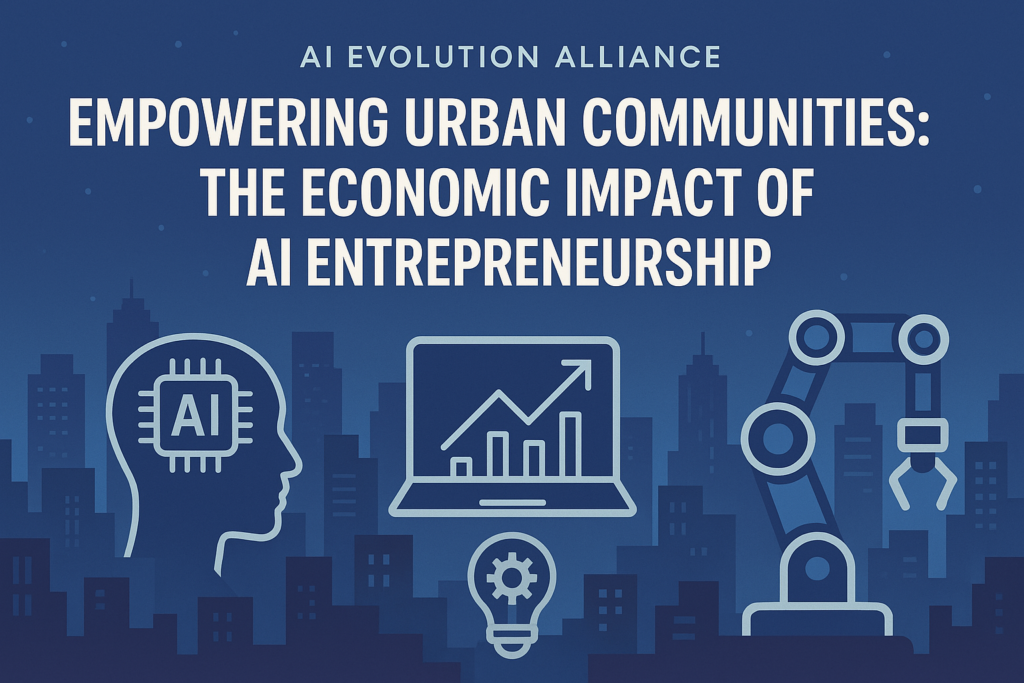
Artificial Intelligence (AI) is revolutionizing industries across the globe, and urban communities stand to gain significantly from this technological advancement. By leveraging AI-driven entrepreneurship, African American and other minority communities can foster economic growth, create sustainable businesses, and bridge the wealth gap. AI provides new opportunities for business innovation, job creation, and increased access to resources that were once out of reach. Here’s how AI technology is transforming urban communities in a positive way through entrepreneurship.
1. AI Lowers Barriers to Business Entry

Historically, starting a business required significant capital, industry connections, and technical knowledge. However, AI is lowering these barriers. With AI-driven platforms, aspiring entrepreneurs can now automate tasks like marketing, customer service, and inventory management. Tools such as chatbots, AI-powered analytics, and automated financial management systems allow small businesses to operate efficiently with fewer resources, making entrepreneurship more accessible than ever.
2. Job Creation and Workforce Development
AI is not just automating jobs—it’s creating new ones. Urban entrepreneurs can build businesses around AI-powered solutions, such as tech support, AI-driven design, and content creation. AI also enables the development of coding boot camps and tech education programs that prepare urban youth for future jobs. By equipping communities with AI-related skills, entrepreneurs can establish businesses that provide employment and economic empowerment.
3. AI-Driven Economic Inclusion
AI fosters economic inclusion by leveling the playing field for Black entrepreneurs. It enables access to better financial insights, improved funding opportunities through AI-powered lending platforms, and enhanced customer outreach via data-driven marketing. With AI, urban businesses can better understand their markets, refine their strategies, and scale their operations.
4. Smart Urban Business Development

Urban entrepreneurs can leverage AI to optimize logistics, improve supply chains, and enhance business efficiency. AI-driven predictive analytics help businesses understand consumer behavior and market trends, allowing them to make data-informed decisions that drive success. AI-powered solutions also facilitate smart city initiatives, improving local infrastructure and business conditions for minority-owned companies.
5. AI in E-commerce and Digital Services
Many urban entrepreneurs are launching AI-driven e-commerce businesses, offering automated customer interactions, personalized recommendations, and smart inventory management. Digital services, such as AI-enhanced graphic design, content creation, and virtual assistance, allow entrepreneurs to compete in global markets without the need for expensive overhead costs.
6. AI-Enabled Financial Growth

Access to funding has historically been a challenge for urban businesses. AI-powered financial tools now assess creditworthiness beyond traditional metrics, offering microloans and business funding options to underserved entrepreneurs. AI-driven financial literacy programs also help business owners make informed decisions about budgeting, investments, and profitability.
Conclusion
AI is not just for tech giants—it’s a tool that urban entrepreneurs can use to uplift their communities economically. By integrating AI into their businesses, entrepreneurs can create more job opportunities, improve efficiency, and compete in global markets. The future of AI-driven urban entrepreneurship is bright, offering endless possibilities for economic growth, financial inclusion, and community development. It’s time for urban communities to embrace AI as a catalyst for success and innovation.
